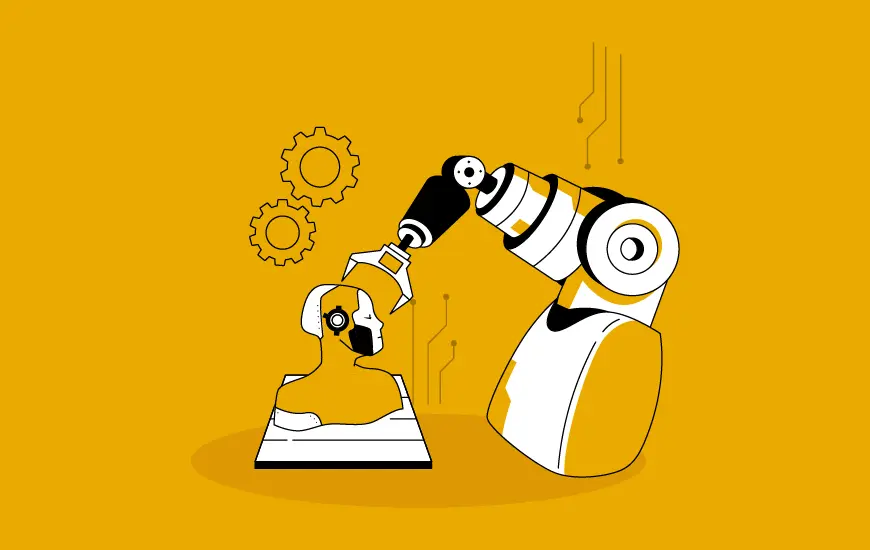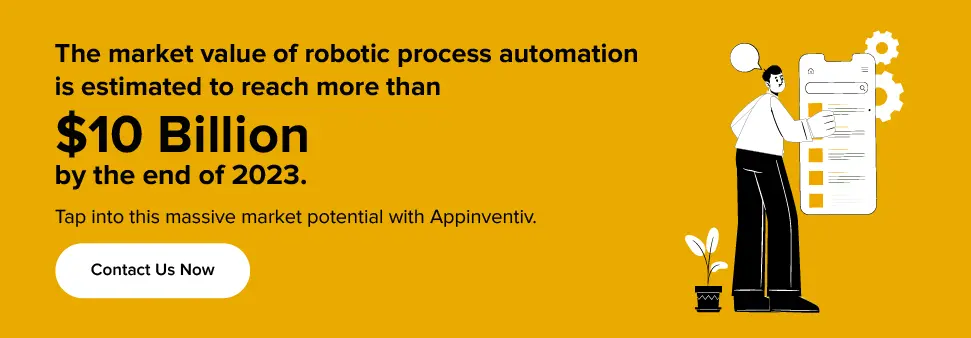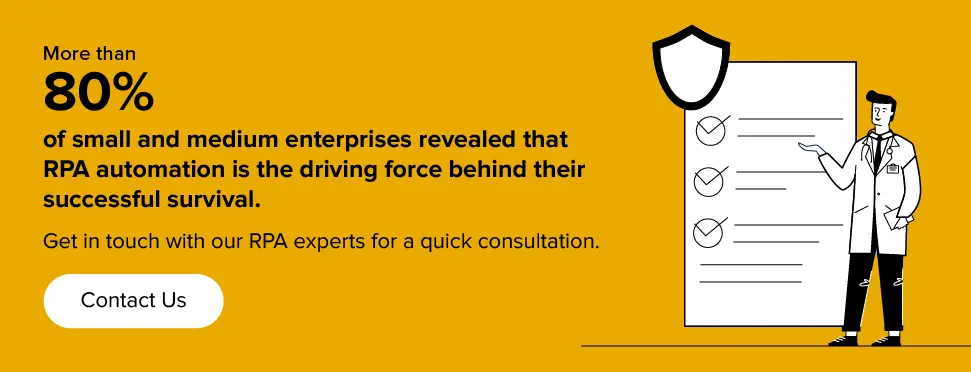- Use Cases of Robotic Process Automation Across Industries
- Human Resource
- BFSI Market
- Healthcare
- e-Commerce
- Customer Support
- Invoice Processing
- Benefits of Robotic Process Automation
- Increase Operational Efficiency
- Boost Employee Productivity
- Enhance Customer Satisfaction
- Improve Accuracy and Compliance
- Reduce Time to Market
- Automating Business Processes to Achieve Excellence - Real-World Examples
- Walmart
- Cleveland Clinic
- AT&T
- American Express Global Business Travel
- Bank of America
- RPA Implementation: Challenges and Solutions
- How Appinventiv Helps You Automate Your Business Processes
- Process Mining
- Make a PoC
- Develop a Pilot
- Testing and Deployment
- Monitor and Maintenance
- How Much WIll It Cost to Automate Your Business Processes?
- The Future of Robotic Process Automation
- Start Your RPA Journey with Appinventiv
- FAQs
Over the last few decades, various waves of technology have swept over and impacted business operations to huge extents. One such technological evolution that has dramatically transformed the business landscape across industries is robotic process automation (RPA).
According to Grand View Research, the global RPA market size was valued at $2,322.9 million in 2022 and is estimated to grow at a CAGR of 39.9% from 2023 to 2030.
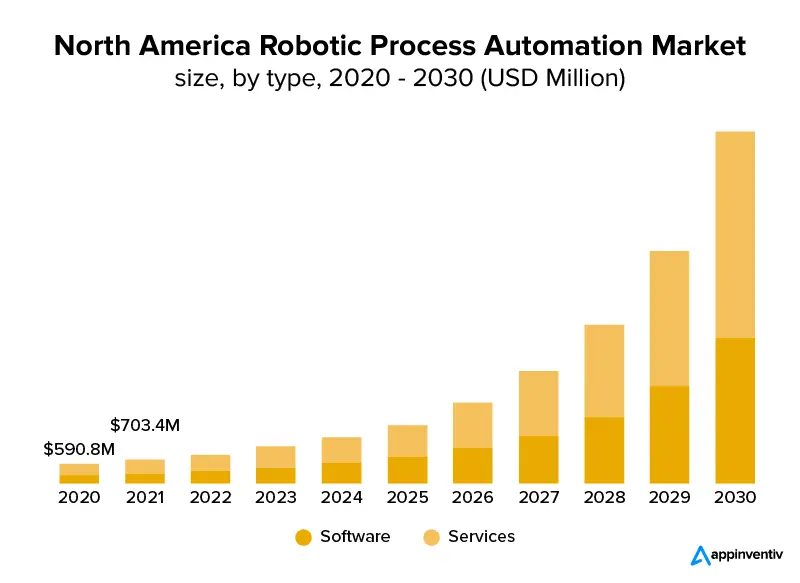
Businesses have been harnessing the power of RPA to automate rule-based and repetitive tasks. And the COVID-19 pandemic has given a further boost to this disruptive technology, making businesses worldwide switch to automated business workflow. It is evident that robotic process automation is not going anywhere, at least for a decade or more.
As stated by Campbell Brown, Vice President of Global Media Partnerships at Meta, “What is happening with automation and globalization, that’s not going away”.
RPA is a great technology to automate operations that involve legacy systems and advance digital transformation. Robotic process automation allows software engineers to develop software bots that can interact with any system; the only difference is that software bots can work nonstop with greater efficiency, faster speed, and zero risk of error.
Program your RPA bots on what to do and let them do all the tiresome work automatically. As the Deloitte Global RPA Survey states, 78% of global businesses have already started their RPA journey; and this figure is constantly being updated. With the rapid growth of RPA, software bots are expected to be widely adopted by companies of all sizes. The market wasn’t expected to hit $2,322.9 million until 2022, and according to Statista, RPA market value is set to reach more than $10 billion by the end of 2023.
To help you start and accelerate your RPA journey, here is a comprehensive guide on enterprise robotic process automation that will change how you think about automation.
Use Cases of Robotic Process Automation Across Industries
The use cases of RPA are widespread and don’t require huge investments or additional installations to automate the processes, provided that you use it effectively.
Eliyahu Goldratt, an Israeli business management guru, stated, “Automation is good, so long as you know exactly where to put the machine”.
RPA bots can be implemented in organizations across different platforms, practices, applications, and departments. Let’s understand in detail the use cases of RPA across industries.
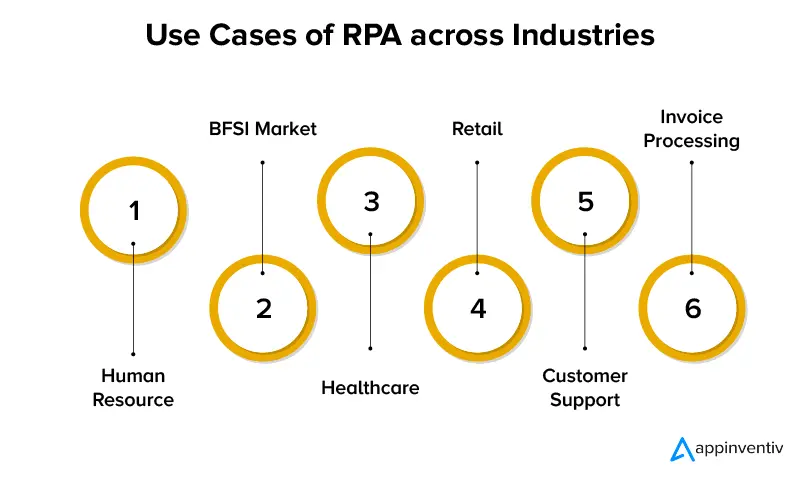
Human Resource
RPA significantly streamlines and transforms various HR processes. Some of the most remarkable use cases of RPA in this area include onboarding and offboarding employees, shortlisting resumes, screening candidates, collecting and validating documents, scheduling interviews, managing attendance and payroll, updating HR dashboards, and so on.
These widespread use cases of robotic process automation tools enable human resource professionalsto recruit the best talents, reduce administrative burdens, deliver better employee experiences, and focus on introducing strategic HR initiatives. At UiPath, the HR team leverages RPA tools to automate employees’ onboarding and offboarding process.
BFSI Market
According to Statista, the RPA market is projected to grow more than $10 billion by the end of 2023, and 36% of all those use cases are from the BFSI market. It means 1 out of 3 RPA bots are in the banking and finance sector, allowing businesses to automate manual tasks related to data entry, account opening, customer research, inquiry processing, invoice processing, financial planning, tax accounting and compliance, and so on. Bancolombia, Zurich Insurance, and Royal Bank of Canada are some of the most prominent examples of financial and insurance companies leveraging RPA across operations.
Healthcare
The use cases of robotic process automation are widespread across the healthcare industry, improving patient care and transforming operations. Some of the world’s largest hospitals, like NHS, harness the power of RPA to improve patient care and automate crucial processes like patient registration, appointment scheduling, information management, insurance verification, claims processing, prescription and account management, and so on. These applications of RPA in the healthcare industry highlight the immense potential of automation in the healthcare industry.
e-Commerce
The ever-growing phenomenon of online shopping has made it essential for the e-Commerce industry to implement the best practices of robotic process automation into the company’s infrastructure. It will help streamline operations, detect fraud, automate tedious processes, and improve customer experience. Warehouse management, customer relationship management, fraud detection, and inquiry processing are some of the common areas where RPA applications can benefit the retail industry.
Customer Support
RPA significantly improves customer service by automating rule-based and repetitive tasks, leading to streamlined operations and improved efficiency. For instance, various regular activities like doing data entry, responding to regular queries, generating automated responses, uploading documents, verifying e-signatures, maintaining customer information, processing transactions, etc., and other repetitive tasks of day-to-day operations can easily and efficiently be automated using RPA bots. It leads to faster response time and reduced risk of human errors, resulting in increased productivity and improved customer satisfaction.
(Also read: Food Automation – How AI and Robotics are Transforming the Future of the Industry)
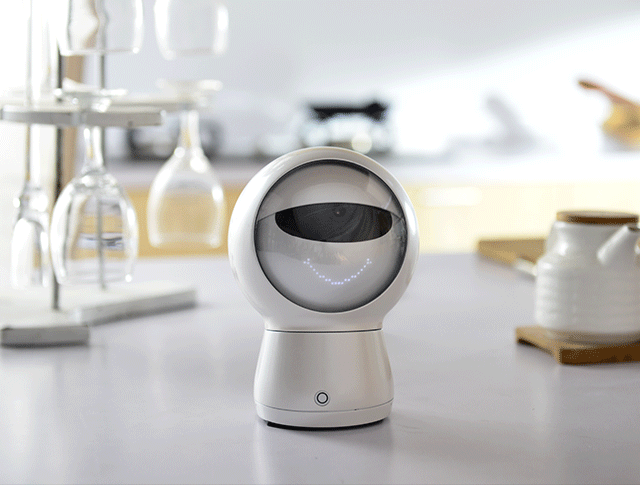
Invoice Processing
Invoice creation is a crucial yet intimidating process for any organization when done manually. Regularly dealing with the pile of files, emails, transaction attachments, etc., takes a lot of time, effort, and resources. Also, doing these repetitive task are more prone to error when performed manually. An RPA bot can quickly and efficiently analyze a large volume of files and dissect data without any human intervention.
In short, the ideal robotic process automation processes are rule-based, repetitive in nature, prone to human error, and of high volume.
Related Article: How to Use RPA in Finance? Use Cases & Real World Examples
Benefits of Robotic Process Automation
Implementing robotic process automation offers numerous benefits to businesses across industries, automating processes and revolutionizing how they function. Here are some of the remarkable benefits of robotic process automation implementation in organizations.
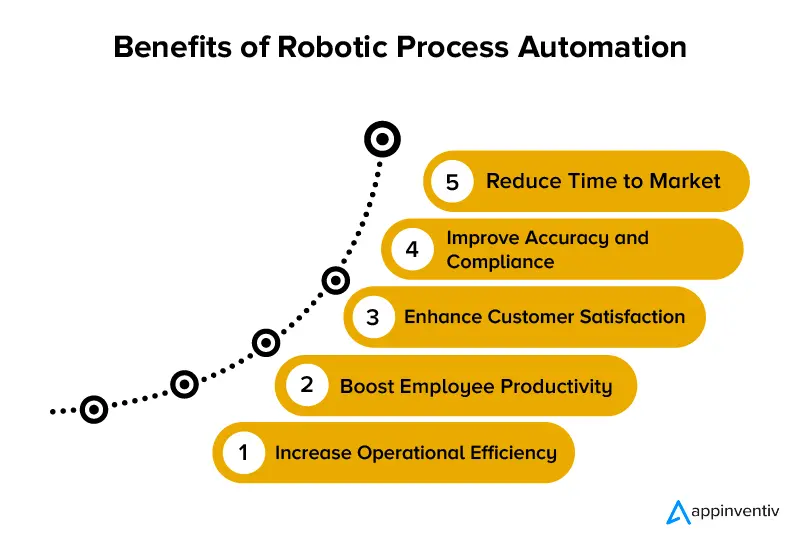
Increase Operational Efficiency
In this cutthroat competitive market, it is nearly impossible for an organization to walk its shoulders high without leveraging software bots to automate operations. Successful implementation of RPA bots can help save time, cost, effort, and human resources required to complete a task, resulting in optimized processes and improved operational efficiency.
Boost Employee Productivity
Since RPA offloads the tedious tasks of the employees, they can use their free time to focus on other higher-priority tasks that necessitate human intervention. It leads to improved productivity and a happier work environment.
Enhance Customer Satisfaction
By automating repetitive and rule-based tasks of high volume, robotic process automation significantly reduces the risk of human errors and speeds up the query resolution time improving many other processes along the way. All this leads to better customer service, resulting in reinforced relationships, higher retention rates, improved credibility, and enhanced customer satisfaction.
Improve Accuracy and Compliance
RPA bots tend to complete complex processes with higher precision, leading to minimizing human errors, particularly in the processes that call for accuracy and compliance. By adhering to predefined rules and regulatory standards, RPA ensures that all the tasks are done as per the industry’s compliance standards.
Reduce Time to Market
Since robotic process automation solutions do not require any complex coding to implement into your IT system, they can be swiftly deployed, enabling businesses to respond rapidly to market demands and foster a competitive edge.
Automating Business Processes to Achieve Excellence – Real-World Examples
There are many business giants that have been harnessing the potential of robotic process automation to streamline operations and transform business processes. Let’s talk about a few of such industry leaders that demonstrate unthinkable agility in harnessing the potential of robotic process automation.
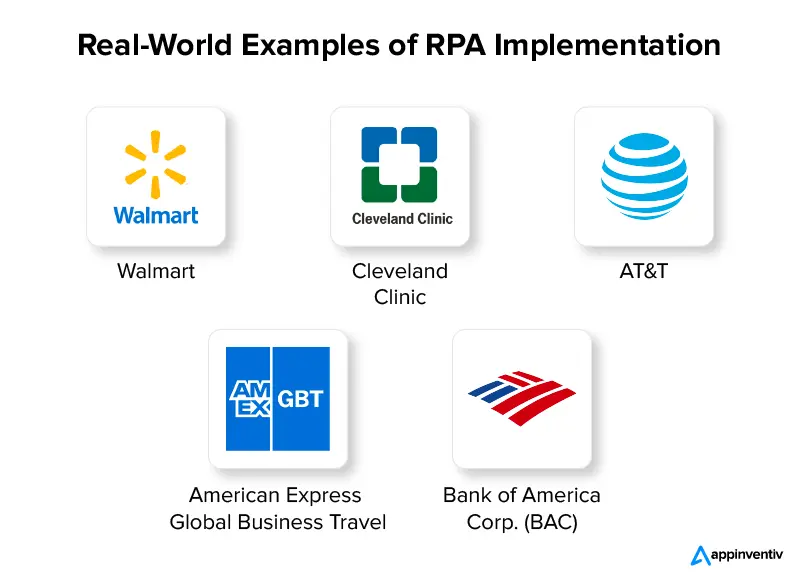
Walmart
Walmart, an undisputed retail giant, uses hundreds of bots to automate its operations and improve customer experience. Answering inquiries, monitoring inventory flow, and retrieving information from audit papers, etc, are some of the most common areas where RPA has greatly benefited this retailer giant. By leveraging the full potential of RPA, Walmart manages to complete many complex processes efficiently, facilitating its employees and enhancing customer experience.
Cleveland Clinic
Cleveland Clinic, one of the best hospitals in the US, has been leveraging RPA bots to automate various processes, including patient data like COVID-19 testing and label printing. With RPA in place, Cleveland Clinic can efficiently complete a task in just 14-16 seconds that a human typically takes 2-3 minutes to execute. What’s more? There are zero instances of errors and an approx 35% reduction in hospitalizations.
AT&T
Amid the COVID-19 pandemic and global lockdown, AT&T faced distinctive challenges adapting to remote work culture. And one of the most daunting challenges arose with phone payments, as US laws don’t allow businesses to access sensitive customer data. To overcome this challenge, AT&T leveraged the power of low-code robotic process automation, ensuring the secure processing of payments without compromising customer privacy. Accordingly, 40,000 AT&T employees could effectively work remotely without facing any setbacks in the workflow.
American Express Global Business Travel
American Express Global Business Travel, a multinational travel management company, is leveraging robotic process automation to automate the tiresome process of airline ticket cancellations and issuing refunds.
Bank of America
Bank of America, a prominent bank, has successfully implemented more than 22 software bots across its back, middle and front offices to improve customer support. The widespread application of robotic process automation in BAC has led to reduced risks, heightened productivity, and cost savings. BAC sets good examples of how robotic process automation trends can yield remarkable outcomes in the banking and finance industry.
RPA Implementation: Challenges and Solutions
The benefits of robotic process automation are limitless, making it a significant implementation for businesses to stay competitive in the digital landscape. But like any other technology, RPA does have some challenges, risks, and limitations in its successful implementation.
- One of the most common challenges businesses face in the successful implementation of robotic process automation is identifying the suitable processes for automation, as choosing the wrong process for automation can lead to inefficiencies.
- The fear of software bots replacing human labor also presents a significant limitation for company acceptance of software robots and RPA implementation. While it is understandable that RPA can reduce the need for human intervention in the various processes, eventually, these bots also require humans to be get updated and re-programmed.
- Technical challenges such as integration of RPA with existing legacy systems, security, and scalability are genuinely the biggest challenge for organizations, preventing them to embrace robotic process automation trends.
- Another significant roadblock commonly encountered by companies in the way of the enterprise robotic process automation journey is establishing corporate support. Robotic automation often fails to gain robust support across the departments, and failure to achieve overall support lead to conflict relating to an individual’s beliefs, responsibilities, and control.
To overcome these robotic process automation challenges, businesses first need to identify what areas of operations necessitate automation and then contact a robotic process automation consulting company to discuss their instances of RPA implementation. With foolproof planning, a strategic roadmap, and effective robotic process automation services, businesses can efficiently overcome these challenges and leverage the full potential of RPA to achieve operational efficiency.
How Appinventiv Helps You Automate Your Business Processes
If you’ve reached this point in the article, it must be evident that robotic process automation is essential for businesses of all sizes across industries worldwide. Therefore, every organization that is willing to harness the full potential of RPA bots and gain a competitive advantage should partner with a reputed IT firm like Appinventiv, which can help you walk the essential steps of successful RPA implementation.
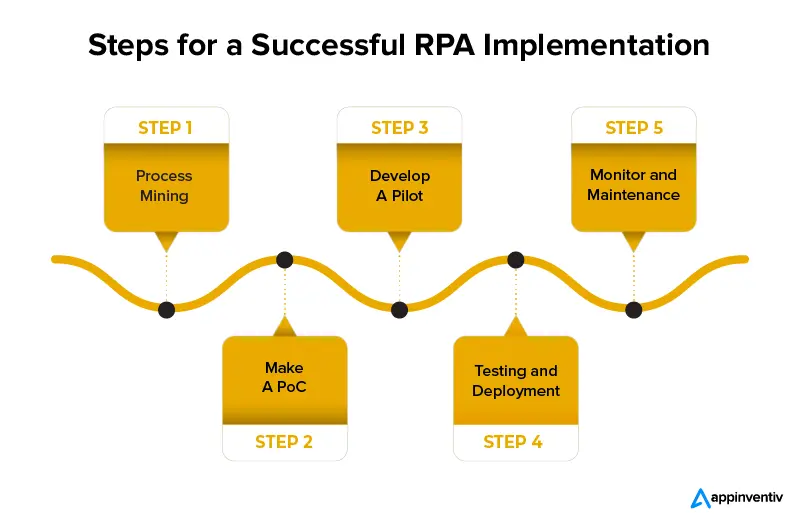
Process Mining
The RPA journey in any industry starts with process mining, as having strategic planning around increasing the operational efficiency of a business is crucial for any large-scale transformation. To help you get started with your automation journey, our automation engineers will mine your processes to identify the essential processes that need to be automated.
Make a PoC
Once we have identified the area of automation, and after consultation with you, we will proceed with the next step to develop a PoC (proof of concept). PoC is the most integral step of an RPA journey, as failing to do it efficiently can lead to wasted time and money. PoC helps test the practicality and efficiency of robotic process automation tools within the business environment. When developing a PoC, our main focus would be on automating the critical processes, not entire operations at once and examining whether the automation efforts drive the expected outcome or not.
Develop a Pilot
After successfully demonstrating the PoC, we will run the pilot automating some parts of your business to test the waters. This step focuses on designing and developing the RPA project where all the programming and configuration activities are performed. An efficient pilot project will be crucial to successful implementation of RPA bots.
Testing and Deployment
Before we integrate software bots into your company’s system, it has to go through a thorough testing process. If the software bots perform as intended, we will integrate them into your company’s digital ecosystem.
Monitor and Maintenance
The RPA journey does not end at deployment. We will constantly monitor and update your robotic process automation efforts to ensure its optimal efficiency across the processes.
How Much WIll It Cost to Automate Your Business Processes?
No matter which industry you’re operating in, RPA is always a valuable solution for your business. The cost of custom RPA tools can range anywhere between $20,000 and $300,000. This massive gap in the cost of robotic process automation is caused due to various factors, including the number of bots, processes to be automated, the complexity of projects, experience, and location of the RPA service provider, and so on.
While there are upfront costs related to RPA implementation, once implemented successfully, RPA helps reduce operational costs and ensures a relatively fast payback that outweighs the initial investment.
The Future of Robotic Process Automation
RPA is soaring high, particularly after the COVID-19 pandemic, and doesn’t seem to slow down anytime soon. In fact, the demand for robotic process automation is now swinging everywhere from larger enterprises to the SME market and beyond.
It is time to stop viewing robotic process automation technology as a tool of the present to automate processes and cut costs; instead, consider it the foundation for the modern business of the future. And the future of RPA is hyper automation and intelligent automation (IA), which open up a world of new opportunities for automation in a broader range of businesses across industries.
HFS report has also observed that businesses are shifting away from viewing robotic automation as a cost-saving tool and taking it as an indispensable implementation in the digital landscape. The integration of RPA into our daily lives and work culture is inevitable, and we should embrace it with open arms.
Start Your RPA Journey with Appinventiv
Robotic process automation implementation can be a transformative and overwhelming journey for your organization, and Appinvetiv is here to stand by you along the way. With our deep understanding of analyzing RPA trends and proficiency in weaving RPA strategy, we have been providing best-in-class RPA services and developing RPA business cases.
We offer a comprehensive suite of robotic process automation services that help you unleash the full potential of automation. Partner with us to leverage our state-of-the-art custom RPA and AI development services to automate and advance your business operations.
Since our inception in 2015, we have achieved a proven track record of delivering 80+ AI-driven projects for businesses spanning across industries. Examples of our remarkable achievements include YouCOMM in healthcare, Vyrb in social media, JobGet in recruitment, and Mudra in the finance industry. These examples serve as a testament to the transformative potential of our AI development services, enabling our clients to put their trust in our offerings and embark on their RPA journey with us.
Ready to get started with your RPA journey and be a future-ready, digitally automated enterprise? Get in touch with us now.
FAQs
Q. What is robotic process automation?
A. Robotic process automation (RPA), also known as software robotics, is a form of business process automation technology that helps automate repetitive and rule-based tasks of human workers. Software bots can do a wide range of defined actions faster and more efficiently than human force without getting tired or requiring a coffee break.
Q. How does robotic process automation work?
A. Robotic process automation technology works by running a pre-defined set of tasks. It programs the software bots at every stage of the process to determine what to do and what not to do. Once the software bots are programmed for every defined task, they can automatically perform the specified task like humans while improving work speed and reducing the risk of errors.
Q. How to implement robotic process automation?
A. There is no one-size-fits-all approach to robotic process automation implementation, but it involves several steps to ensure successful integration. Here are some general steps followed by RPA experts during its implementation process.
- Identify the process that requires automation
- Create an implementation plan
- Develop a proof of concept (PoC)
- Develop a pilot
- Test and deploy
- Monitor and maintenance
Please refer to the blog for a detailed overview of the RPA implementation process.


- In just 2 mins you will get a response
- Your idea is 100% protected by our Non Disclosure Agreement.
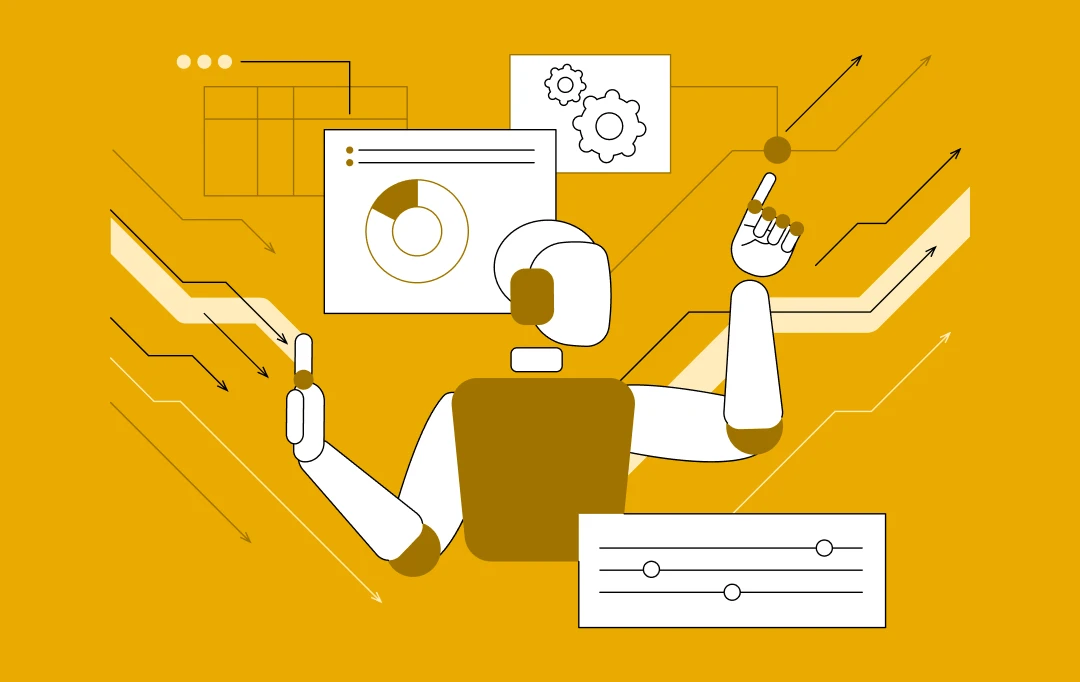
How to Integrate AI with EHR/EMR Systems for Streamlined Healthcare Operations
Key takeaways: Not adopting AI in EHR/EMR today risks falling behind. AI streamlines EHR workflows, cutting clinical and admin delays. Real-world hospitals are already seeing faster, smarter care with AI. Seamless AI integration needs system checks, data prep, and training. AI in EHR tackles real challenges like bias, cost, and compliance. Custom AI integration costs…

AI Agent-Driven UIs: Replacing App Menus and Buttons
Key takeaways: Challenge: Static menus and buttons also become outdated because people are frustrated by limited, multi-stage navigation. Solution: The AI Agent interacts with the user through a friendly UI that does not require cludgy menus but conversational and context-sensitive navigation. The Way AI Agents Work: AI agents establish a basis of natural language understanding,…

10 Use Cases and Benefits of How AI Agents Are Revolutionizing the Retail Industry
Key takeaways: AI agents in the retail industry are revolutionizing businesses by enhancing customer experience and streamlining operations. From personalized recommendations to predictive analytics, AI offers tangible benefits like increased conversions and reduced costs. AI adoption can lead to scalable growth and a competitive edge in the retail industry. Retailers must consider data strategies, talent…






